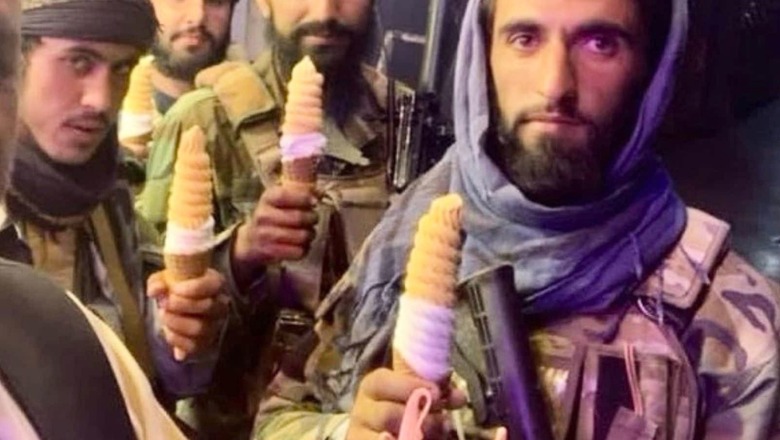
views
The Taliban that emerged in 1994 and ruled 90% of Afghanistan from 1996 to 2011 were hostile to practices like public relations exercises. The radical insurgent group followed strict religious codes and banned most media of communication in the guise of Islamic principles. The Taliban rule made women slaves and Afghan society under them grew poorer, radicalised and backward as the government there had no international legitimacy, and so no chances to grow economically. It had no money to run schools or hospitals. In 1996, only two countries other than Pakistan recognised the Taliban government – Saudi Arabia and the United Arab Emirates.
Watching television was banned because, as per the Taliban, it carried un-Islamic content. Similar was the fate of music and cinema. While Talibs used radio, print media and satellite phones for internal communication, their interviews and interaction with the Press were a rave event.
And they presented it as a victory whenever they faced any journalist or media house. For making women non-entities or slaves, they said it was the need of the Sharia that the Taliban followed. For making Afghan society poorer and radicalised, they simply quoted the fact that the Taliban regime did not have financial resources to support it.
But why the same Taliban all of a sudden, after routing and winning Afghanistan again, after 20 years and in just two-three months this time, have become so desperate for PR?
The Taliban leadership this time has promised that there would be no revenge killing with general amnesty given to all Afghans who worked with the previous government and international forces.
The Taliban government that made women non-entities last time now wants to assure the world that the Taliban would not let women get victimised. They are fine with hijab or headscarves this time, unlike the 1990s when burqa, which covers the whole body, was made mandatory. They also want to assure the world that the Taliban would even give women a chance to be a part of the government.
Also, a Taliban spokesperson, unlike the 1990s, has given an interview to a female newsreader of a private channel this time.
Rush for international legitimacy
But why the haste all of a sudden now, when the Taliban still brag that they have defeated the United States and warn India and other countries to not help the previous civilian government and rival tribal warlords?
That’s because news from Afghanistan’s hinterland is now emerging that the Taliban are back to their cruel ways of the 1990s. Reports say the Taliban showed a similar level of barbarity while capturing cities even this time. Widespread loot and executions followed. Girls, even teenagers, and women were forcibly married off with Taliban fighters. Female students in Taliban-captured areas were not allowed in schools.
It’s also because this Afghanistan is not the Afghanistan of the 1990s. The Afghanistan of the 1990s was a hub for Islamic terror under Taliban rule that disturbed the whole world with violent events like 9/11. So, the global attention is towards Afghanistan this time, unlike in the 1990s, especially when the Taliban are going to rule again. And this regime can easily be overturned by helping rival groups if the Taliban don’t toe the line or don’t look like doing it.
Need money
Da Afghanistan Bank, the central bank of the country, had assets of around $9.5 billion that the US has frozen including the cash shipment so that the Taliban can’t get access to it. Also, as per Ajmal Ahmady, who headed the DAB and fled Afghanistan after the takeover, “the accessible funds to the Taliban are perhaps 0.1-0.2% of Afghanistan’s total international reserves”. As per Ahmady, while the bulk of DAB assets are at the US Federal Reserve, the leftover amount is also held in other international accounts.
This means the Taliban are not going to get any funds from Afghanistan’s central bank.
Ahmady added that the Taliban may have won militarily but now they will have to govern and it is not going to be easy. According to him, Afghanistan under Taliban rule is heading towards a crisis where “Taliban will have to implement capital controls and limit dollar access. The currency will depreciate and inflation will rise and this will hurt Afghanis even more as prices would increase, especially food prices for poor Afghanis”.
So, the Taliban desperately need money.
In fact, the Taliban need huge amounts of money, not only to govern the country but also to manage their fighters and their positions across the country.
During the civil war phase, the Taliban followed guerrilla warfare tactics and overran the Afghan special forces. The country had around 10,000 special forces soldiers. They were spread too thin across the country and the Taliban easily overran them. Now the Taliban are in the same situation.
Afghanistan’s vice president under the previous government, Amrullah Saleh, who claims to be the caretaker president of the country, has decided to go for a full-scale war and he may be joined by tribal warlords like Abdul Rashid Dostum, Ahmad Massoud, Atta Noor and others in future. Even Ashraf Ghani, with his Twitter bio still calling him the President of Afghanistan, has called for Afghan forces to give a final response to the Taliban.
And to counter them as well as run the country, the Taliban need much more money than the estimated annual earnings of $1.5 billion. Pakistan will not be in a position to help due to its poor economic situation. It means the Taliban need international legitimacy and financial support from other countries.
US warned that it will isolate the Taliban government
The American government had warned that it will isolate the Taliban government if it captures power forcibly. The Taliban have done that. The agreement with the US was for a peaceful political settlement. Instead, the Taliban have taken over the country, or at least a large part of it, by force, declaring that Afghanistan under them will not be a democracy but will follow a Sharia-based system governed by a Taliban council.
So, if the US is going to isolate the Taliban, it means the Taliban need support from other governments to get foreign funds to support their rule in a poor country that they have won largely by paying bribes this time. According to a Washington Post report, the Taliban brokered deals with Afghan government officials in rural areas, districts and provinces of the country to push them to desert the country’s army and hand over their weapons to the Taliban. The Taliban began this exercise around 18 months ago.
Also, US President Joe Biden and US Secretary of State Antony Blinken have warned that they will not let Afghanistan become a terror hub again, like it was in the 1990s under Taliban rule. Blinken in fact talks about taking international partners together to closely monitor the Taliban policies and attitude on terror and women’s rights.
Biden is being criticised for his decision of complete withdrawal from Afghanistan. His popularity is going down and is now at the lowest level since he took the US President’s office in The White House seven months ago. He is expected to tighten the noose on the Taliban because a deteriorating human rights situation in Afghanistan or the country becoming a terror hub again means his popularity will plummet further, coupled with more humiliation for the US.
Diplomacy is key
Because they won’t listen to a fundamentalist radical militant group of the 1990s, the Taliban are trying to make diplomatic overtures towards regional neighbours like Iran, China, Russia and Central Asian countries. The Taliban of the 1990s hated Iran but this time are courting the same country because it is anti-US. The Taliban have even requested India to change its stance towards them. India considers the Taliban a fundamentalist insurgent group.
The Taliban desperately need to change their image of being a radical, hardline group to a moderate face that is reaching out to the world this time even if questions remain about their opaque nature. The Taliban consist of hardline fighters educated in radical madrasas and the leadership cannot force them to change their behaviour overnight.
Read all the Latest News, Breaking News and Assembly Elections Live Updates here.



















Comments
0 comment